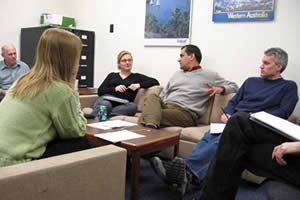28 February 2006
Two Americans . . .
 Two
Americans, a Canadian, two Bulgarians, a Chinese, a Greek, an Australian,
a New Zealander and an Italian meet in a lounge. This might have
been the start of the world's longest, worst joke. As it happens,
it was not. It was the weekly meeting of the reading group of the
Visiting Fellows at the Center for Philosophy of Science. Two
Americans, a Canadian, two Bulgarians, a Chinese, a Greek, an Australian,
a New Zealander and an Italian meet in a lounge. This might have
been the start of the world's longest, worst joke. As it happens,
it was not. It was the weekly meeting of the reading group of the
Visiting Fellows at the Center for Philosophy of Science.
Today is February 28--well into the term--and we are drawing to
the end of the series of meetings. For each, a Visiting Fellow circulated
a short manuscript of a dozen or so pages on some aspect of their
latest research. The reading group then meets and dissects it. Topics
have been widely spread so far, from a critical examination of the
likelihood principle, to theories of history and feminist approaches
to philosophy of science.
This week the topic is action theory. How can we make sense of omissions
in action theory? They are actions as long as they have causal powers,
argues Gabriele De Anna. The discussion starts immediately. The
presumption is that everyone has read the manuscript so there is
no need for Gabriele to explain to everyone just what his claims
are. The questions are tough and start with Carla. Why Mackie? Why
INUS? Couldn't all this be done better using a counterfactual
account of causation? Why not use difference makers? Gabriele is
thoughtful. Wouldn't that be too complicated? All those possible
worlds? The questions keep coming. What is your definition of causation?
Why not counterfactuals? Gabriele is getting his rhythm. What are
the truth conditions for counterfactuals?
It goes like this. Questions. Answers. Elaborations. Rejoinders.
Eager as they are to join in, everyone is taking their turn. And
sometimes not. "To follow up on that last question," one interjects,
but as the follow up unfolds it becomes clear that the questioner
has just hi-jacked the discussion. An hour passes and then an hour
and half. Now the discussion is less energetic. The group is engaging
more with the drift of the project and questions become more reflective.
"So where does action theory come from," I finally ask. "I've never
really know why we have a theory of it rather than a theory of ..."
"Betty?" someone volunteers. We all laugh, but the answers flood
in. Wittgenstein, someone calls out.
As the two hour mark approaches, the discussion turns to the more
serious matter of deciding where we will go to eat. A few different
restaurants are canvassed. One is summarily rejected since it does
not have a liquor license. We have transcended the thirst for understanding
with another thirst.
John D. Norton
Visiting Fellows Reading Group
28 February 2006
|


![]()
![]()
 Two
Americans, a Canadian, two Bulgarians, a Chinese, a Greek, an Australian,
a New Zealander and an Italian meet in a lounge. This might have
been the start of the world's longest, worst joke. As it happens,
it was not. It was the weekly meeting of the reading group of the
Visiting Fellows at the Center for Philosophy of Science.
Two
Americans, a Canadian, two Bulgarians, a Chinese, a Greek, an Australian,
a New Zealander and an Italian meet in a lounge. This might have
been the start of the world's longest, worst joke. As it happens,
it was not. It was the weekly meeting of the reading group of the
Visiting Fellows at the Center for Philosophy of Science.